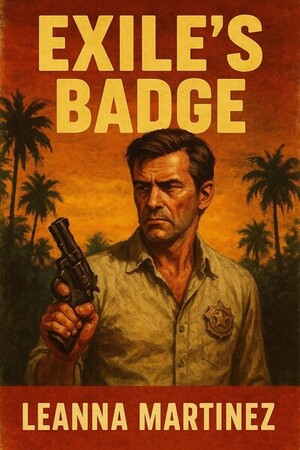Chapter 14:
Ghost Works
Exile's Badge
The weeks blurred into a rhythm, the kind that only men living in shadows understood. Mornings bled into nights, nights bled into mornings, and Sam found himself moving through the motions of surveillance like a man slipping back into an old, worn uniform.
They sat in vans with blacked-out windows, watching dockside warehouses through binoculars. They logged plate numbers on grease-stained notepads, wrote coded observations that would mean little to anyone else. The younger agents lived on sunflower seeds and cheap coffee, restless, impatient, always fiddling with the radios or cracking jokes to fill the silence.
Sam didn’t joke. He didn’t fidget. He sat still, eyes fixed, watching the rhythms of the docks.
At first, they still treated him like a tagalong, a washed-up cop whose time had passed. But slowly, the edges began to shift. They noticed how he caught things they missed: the twitch of a guard’s jaw when a truck pulled up late, the nervous way a dockhand wiped his hands on his pants before signing off a manifest, the unspoken signals between men who were pretending not to know each other.
Sam read bodies like other men read newspapers. Small things, easy to overlook. But they meant something. They always did.
Doyle saw it too. He didn’t say much, he never did, but Sam noticed the way the federal man’s eyes lingered on him when he pointed out a detail no one else had clocked. Doyle knew. This was why he’d pulled Sam in. Not to play soldier. Not to carry a rifle. But to do the kind of reading that couldn’t be taught in a training manual.
* * *
When Doyle started giving him informant work, the agents muttered, but they didn’t argue.
The first was a dockhand, small-time, drunk half the time, desperate the rest. Doyle pushed the file across the table. “He’s yours.”
Sam met the man in a dingy cantina off the waterfront. The jukebox was broken, the beer flat, the floor sticky with decades of spills. The dockhand sat hunched at a corner table, eyes darting every time the door opened. Sam slid into the opposite chair, set two beers down, and let the silence stretch.
“Don’t know nothin’,” the man muttered, before Sam had said a word.
Sam sipped his beer, eyes never leaving him. “Sure you do. Everybody knows something. It’s just a question of how much you’re willing to sell.”
The dockhand’s hands shook as he reached for his bottle. Sam let him. Then, quiet, steady, he leaned across the table. “Listen. I don’t need everything. Just enough to keep you useful. You give me lies, I’ll know. You give me nothing, and I walk away. You give me something real, maybe next week you’re still breathing. That’s the deal.”
The man’s eyes flickered in fear and calculation, followed by a flicker of greed. Then he nodded once. “I heard about a shipment. Midnight. East pier. No manifests.”
Sam leaned back, taking another sip. He didn’t smile, didn’t threaten. He just let the weight of his words hang. “Good. Keep listening. Don’t get stupid.”
* * *
Other meetings followed. A small-time dealer with debts too high to cover. A courier who thought he was untouchable until Sam blocked his path in a narrow alley and asked one question too many. None of them cracked fast. They never did. But Sam had patience. He knew when to press, when to back off. He’d spent years walking that line, too soft and they lied, too hard and they shut down. Push just enough, though, and they spilled.
The agents didn’t like it. His methods weren’t clean. But they worked. And Doyle knew results mattered more than style.
* * *
For the first time since San Francisco, Sam felt useful again. Not whole, never whole, but steady. The work gave him shape, gave him something to push against besides the bottom of a bottle.
But he also knew the truth. This wasn’t justice. These weren’t his streets anymore. Every night he went back to the safehouse, he reminded himself: he was a ghost in someone else’s war. Nothing more.
* * *
The break came from a man named Alvarez, a courier Sam had leaned on for weeks. Skinny, nervous, always smelling of cheap cologne and fear. At first, he swore he didn’t know anything—just a runner moving envelopes. But Sam kept showing up: on the pier when Alvarez was unloading crates, in the cantina when he tried to drink himself steady, outside his apartment when he stumbled home at dawn. Not threatening, not violent. Just present. Like gravity.
Finally, one night, Alvarez cracked.
“They move it Tuesdays,” he whispered, hunched over his beer, eyes darting around the cantina. “Always Tuesdays. East pier, two trucks. Manifest says fish, but it’s not fish. It’s never fish.”
Sam didn’t press. He just nodded, slid enough pesos across the table for another round, and told him to stay quiet.
* * *
Surveillance proved Alvarez right. The following Tuesday, the team watched from their battered van as two trucks rolled in under the cover of fog. The manifests listed frozen tuna, but the crates loaded into the trucks bore no marks, no ice.
“Fish doesn’t sweat,” Sam muttered, pointing to the condensation running off the wooden slats.
Doyle gave a single nod. The younger agents stiffened, adrenaline sharpening their chatter. They had something real now, something to take upstairs.
But Doyle didn’t take it upstairs. He kept it in-house. “We move on this ourselves,” he told them, voice low. “Keep it clean. Keep it off paper.”
That night, they set the trap.
* * *
The sting went down just before midnight. The trucks pulled out of the yard, rolling slow toward the open road. Sam rode in the lead van with Doyle, his revolver heavy under his coat. The other agents followed in a second vehicle, rifles ready.
When the convoy reached the industrial stretch outside town, Doyle gave the signal. Lights flared. Engines roared. The DEA vans boxed the trucks in, tires squealing against the asphalt.
“¡Policía! Manos arriba!” The agents spilled out, rifles leveled, voices sharp in Spanish and English.
The drivers panicked. One slammed the brakes, another tried to throw his truck into reverse before an agent smashed the window and dragged him out. The air filled with shouts, curses, the sound of boots on gravel.
Sam moved with calm precision. He wrenched open the back of the lead truck, the stench of damp wood and chemicals spilling out. Inside, the crates gleamed under flashlight beams—bricks wrapped in plastic, stacked waist-high. Cocaine. Enough to make headlines.
But it wasn’t the drugs that mattered. It was the man they pulled from the passenger seat of the second truck. A mid-level lieutenant, one of Caruso’s handlers. He went down cursing, fists swinging until Sam pinned him against the hood. Doyle’s men zip-tied his wrists, shoved him into the van.
It was messy, loud, but when the dust settled, they had everything they came for: product seized, men in cuffs, and a lieutenant who might actually talk.
* * *
Back at the safehouse, the mood was electric. The agents buzzed on adrenaline, slapping each other’s backs, grinning like they’d won a championship. Even Doyle allowed himself the faintest curl of a smile.
Sam sat in the corner, cigarette smoke curling above him, watching the lieutenant slump in a chair with bruises on his jaw and rage in his eyes.
It felt good, for a moment. The old rush, the pieces clicking into place, the bad man finally sitting in cuffs, the chain tightening around Caruso’s empire. Sam felt the clarity he used to chase, the reason he’d carried a badge.
But it was thin.
Because Caruso wasn’t in that chair. Caruso was still out there, untouchable, laughing at charity galas, shaking hands with councilmen. This lieutenant, this seizure, it was a scratch, nothing more.
Sam took a long drag, exhaled through his nose, and let the smoke blur the room. The agents could celebrate. Doyle could tally his victories. But Sam knew the truth. Caruso wouldn’t bleed from this. Not yet.
The victory felt like a ghost. It was real enough to see, but impossible to hold.
* * *
The body washed up three days later.
Sam was the first to hear the word drifting through the docks before Doyle’s men had even mobilized. A dockhand found him at dawn, tangled in nets, face pale under the weak sunlight. The throat had been cut clean, a single red line across the neck. Not sloppy, not desperate. Professional.
Sam knew him. The dockhand who had given him times and names, who had whispered details over flat beer and shaken hands. He hadn’t been a hero, just a man scared enough to talk and greedy enough to hope he could buy himself a little safety.
Now he was nothing but a warning.
When the team gathered, Doyle read the report like it was another line item. “Retaliation. Caruso knows we’re digging. That’s the message.” The younger agents nodded grimly, some angry, some eager. To them, it was proof of progress, the enemy bleeding back.
Sam said nothing. His fists clenched until the tendons in his hands stood out, white and sharp.
Later, when the others were scribbling notes and running logistics, Sam slipped away. He walked the shoreline where the body had been found, the sand damp and cold under his boots. The air smelled of brine and rot, the tide gnawing at the rocks with steady patience.
He crouched where the dockhand had lain, eyes tracing the marks in the sand already fading under the tide. Ghosts never stayed long here. The sea took them quick, swallowed their stories whole.
The agents could call it “part of the job.” Doyle could chalk it up as inevitable. But Sam felt the weight of it in his chest, heavier than any crate of drugs they’d seized. The man had trusted him, and now he was dead for it. Another life wasted in a war that couldn’t be won.
Sam lit a cigarette, cupping the flame against the wind, and inhaled deep. The smoke mixed with the salt air, bitter on his tongue. He stared out at the dark horizon, where the water merged with the sky, and let the memory of the dockhand’s face fix itself into his mind.
Caruso had written the message clear: I can reach you. Anywhere. Anytime.
Sam’s hand drifted to the revolver at his side, the weight familiar, reassuring and useless all at once. He didn’t draw it. He just let it hang there, a reminder that he was alive only because Caruso allowed it.
The tide rushed in again, washing over the sand, erasing the last trace of the man who had trusted him.
Sam stood, smoke trailing from his lips, and walked the shoreline alone.
He knew now that his ghost life was fragile. And Caruso’s reach had no borders.




Please sign in to leave a comment.